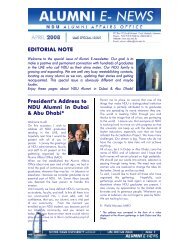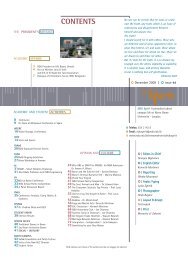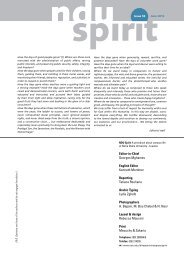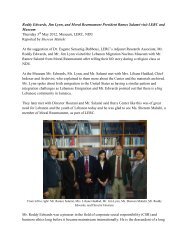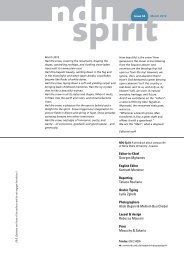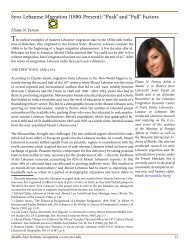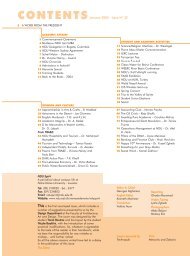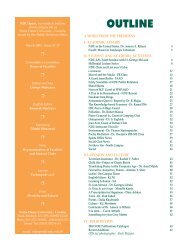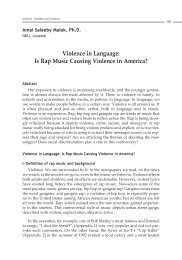Editor-in-Chief Georges Mghames English Editor Kenneth Mortimer ...
Editor-in-Chief Georges Mghames English Editor Kenneth Mortimer ...
Editor-in-Chief Georges Mghames English Editor Kenneth Mortimer ...
Create successful ePaper yourself
Turn your PDF publications into a flip-book with our unique Google optimized e-Paper software.
Break<strong>in</strong>g the Stereotype:<br />
Towards mutual understand<strong>in</strong>g between<br />
East and West<br />
‘Break<strong>in</strong>g the stereotype, From Orient and Occident<br />
to a Mutual Understand<strong>in</strong>g of Images’ is an exhibit, a<br />
conference and a book. The Break<strong>in</strong>g the Stereotype<br />
series of exhibits started <strong>in</strong> 2006 and <strong>in</strong>cluded schools<br />
and universities <strong>in</strong> Austria, Italy, Turkey, and Lebanon.<br />
NDU played a lead<strong>in</strong>g role from the very beg<strong>in</strong>n<strong>in</strong>g,<br />
with the help of professors, students, and researchers<br />
<strong>in</strong> the Graphic Design Department and the Lebanese<br />
Emigration Research Center.<br />
The conference <strong>in</strong> Turkey was the f<strong>in</strong>al stage of the<br />
four-year project, which was <strong>in</strong>itiated by the research<br />
focus ‘Cultures <strong>in</strong> Contact’ at Leopold-Franzens<br />
University at Innsburk (Austria) and <strong>in</strong> which scholars<br />
and students from Leopold-Franzens University, Kadi<br />
Has University and Dokuz Eylul University (Turkey)<br />
along with Lebanese universities LAU and NDU have<br />
cooperated.<br />
The aim of the project was the documentation of the<br />
products of Oriental and Occidental stereotyp<strong>in</strong>g, the<br />
mechanisms active <strong>in</strong> the stereotyp<strong>in</strong>g processes and<br />
the attempt to open both of them to de-construction<br />
and contrast the representations of cultural perception<br />
concern<strong>in</strong>g the Orient and the Occident with the<br />
representation of both self-perceptions as they appear<br />
<strong>in</strong> literature, the media and everyday life <strong>in</strong> order to<br />
break the stereotypes. The conference was held <strong>in</strong><br />
Turkey this past October and was attended by literature<br />
and political science students from NDU, along with<br />
professors Naji Oueijan and Eugene Sensenig-Dabbous<br />
The conference was documented <strong>in</strong> published<br />
proceed<strong>in</strong>gs, launched at NDU <strong>in</strong> May 2011, <strong>in</strong>clud<strong>in</strong>g<br />
a book sign<strong>in</strong>g with the authors, Sensenig-Dabbous,<br />
Oueijan and Bassem Kamel.<br />
The volume of conference proceed<strong>in</strong>gs, published<br />
by the Innsbruck University Press (2011, ISBN: 978-<br />
3-902719-97-3) is structured along the l<strong>in</strong>es of the<br />
conference itself. Sensen<strong>in</strong>g-Dabbous, chairman of the<br />
Faculty of Political Science, chose the war report<strong>in</strong>g<br />
by two WWI reporters, Richard A. Bermann and John<br />
Reed, to discuss Bermann’s description of the ‘Oriental<br />
Conference and<br />
Exhibit Poster<br />
Issue 52<br />
June 2011<br />
Frontier’ between the Hasburg and the Ottoman<br />
Empires that juxtaposed the writ<strong>in</strong>g of Reed, who<br />
travelled <strong>in</strong> the same region immediately prior to<br />
the US entry <strong>in</strong>to the war as an enemy of the Central<br />
Power. He attempted to isolate aspects of Orientalist<br />
cultural traditions with<strong>in</strong> the two writers’ antiimperialist<br />
and anti-war journalism.<br />
Bassem Kamel, <strong>in</strong>structor <strong>in</strong> the Faculty of Humanities,<br />
placed Edward Said’s role as an <strong>in</strong>tellectual leader of<br />
the Eastern emancipation movement. Kamel po<strong>in</strong>ted<br />
out that accord<strong>in</strong>g to Said, the <strong>in</strong>tellectual should have<br />
a critical consciousness which transcends the cultural,<br />
political, religious and social restrictions and and puts<br />
him <strong>in</strong> therole of the secular critic who can see the<br />
world <strong>in</strong> a pluralistic vision and is able to “speak truth<br />
to power” <strong>in</strong> an “<strong>in</strong>tellectual <strong>in</strong>tifada”.<br />
Naji Oueijan, Professor <strong>in</strong> the Faculty of Humanities,<br />
reviewed the history of travel deal<strong>in</strong>g with the Orient<br />
reach<strong>in</strong>g back as far as the Middle Ages <strong>in</strong> def<strong>in</strong><strong>in</strong>g the<br />
social contexts <strong>in</strong> which journeys to the East have taken<br />
place over the centuries. In his article he “<strong>in</strong>tends to<br />
show the veracity beh<strong>in</strong>d a cross-cultural misconception<br />
rather than judg<strong>in</strong>g one or the other.” Ouijan argued<br />
that travelers such as Sherley Brothers, Richard<br />
Chandler, and James Bruce, as well as Orientalists such<br />
as Simon Ockley, George Sale, and Sir William Jones,<br />
have re-presented Orientals <strong>in</strong> a more accurate way<br />
than was the case with the Crusaders and that <strong>in</strong> so<br />
do<strong>in</strong>g they have been able to change the images of the<br />
East held by the Western public.<br />
The book thus offers a cross section of current research<br />
on Orientalist and Occidentalist culture and thought<br />
from a wide variety of perspectives. The hope of those<br />
51



